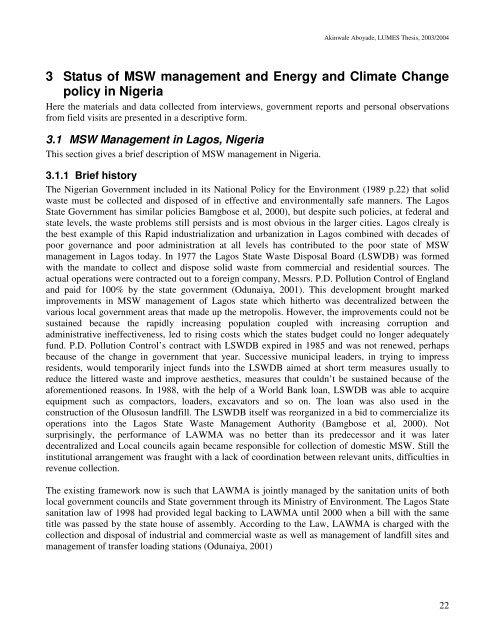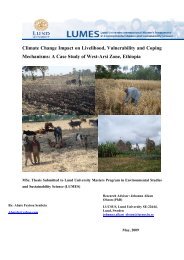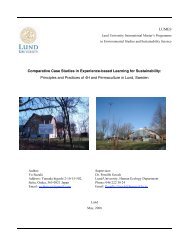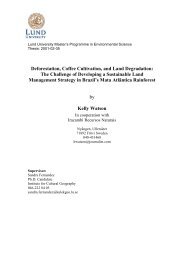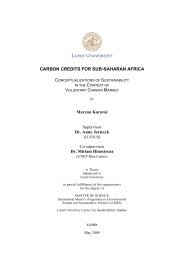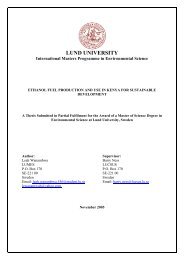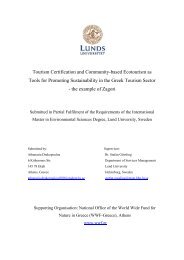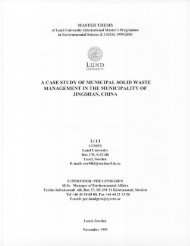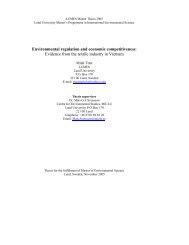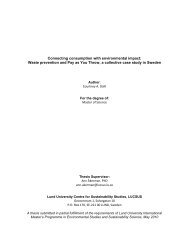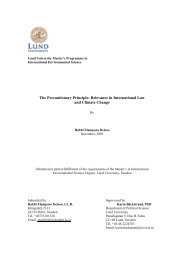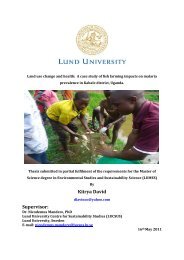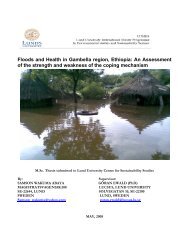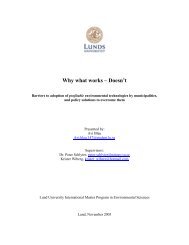Wale Aboyade's thesis - lumes
Wale Aboyade's thesis - lumes
Wale Aboyade's thesis - lumes
Create successful ePaper yourself
Turn your PDF publications into a flip-book with our unique Google optimized e-Paper software.
Akinwale Aboyade, LUMES Thesis, 2003/2004<br />
3 Status of MSW management and Energy and Climate Change<br />
policy in Nigeria<br />
Here the materials and data collected from interviews, government reports and personal observations<br />
from field visits are presented in a descriptive form.<br />
3.1 MSW Management in Lagos, Nigeria<br />
This section gives a brief description of MSW management in Nigeria.<br />
3.1.1 Brief history<br />
The Nigerian Government included in its National Policy for the Environment (1989 p.22) that solid<br />
waste must be collected and disposed of in effective and environmentally safe manners. The Lagos<br />
State Government has similar policies Bamgbose et al, 2000), but despite such policies, at federal and<br />
state levels, the waste problems still persists and is most obvious in the larger cities. Lagos clrealy is<br />
the best example of this Rapid industrialization and urbanization in Lagos combined with decades of<br />
poor governance and poor administration at all levels has contributed to the poor state of MSW<br />
management in Lagos today. In 1977 the Lagos State Waste Disposal Board (LSWDB) was formed<br />
with the mandate to collect and dispose solid waste from commercial and residential sources. The<br />
actual operations were contracted out to a foreign company, Messrs. P.D. Pollution Control of England<br />
and paid for 100% by the state government (Odunaiya, 2001). This development brought marked<br />
improvements in MSW management of Lagos state which hitherto was decentralized between the<br />
various local government areas that made up the metropolis. However, the improvements could not be<br />
sustained because the rapidly increasing population coupled with increasing corruption and<br />
administrative ineffectiveness, led to rising costs which the states budget could no longer adequately<br />
fund. P.D. Pollution Control’s contract with LSWDB expired in 1985 and was not renewed, perhaps<br />
because of the change in government that year. Successive municipal leaders, in trying to impress<br />
residents, would temporarily inject funds into the LSWDB aimed at short term measures usually to<br />
reduce the littered waste and improve aesthetics, measures that couldn’t be sustained because of the<br />
aforementioned reasons. In 1988, with the help of a World Bank loan, LSWDB was able to acquire<br />
equipment such as compactors, loaders, excavators and so on. The loan was also used in the<br />
construction of the Olusosun landfill. The LSWDB itself was reorganized in a bid to commercialize its<br />
operations into the Lagos State Waste Management Authority (Bamgbose et al, 2000). Not<br />
surprisingly, the performance of LAWMA was no better than its predecessor and it was later<br />
decentralized and Local councils again became responsible for collection of domestic MSW. Still the<br />
institutional arrangement was fraught with a lack of coordination between relevant units, difficulties in<br />
revenue collection.<br />
The existing framework now is such that LAWMA is jointly managed by the sanitation units of both<br />
local government councils and State government through its Ministry of Environment. The Lagos State<br />
sanitation law of 1998 had provided legal backing to LAWMA until 2000 when a bill with the same<br />
title was passed by the state house of assembly. According to the Law, LAWMA is charged with the<br />
collection and disposal of industrial and commercial waste as well as management of landfill sites and<br />
management of transfer loading stations (Odunaiya, 2001)<br />
22


